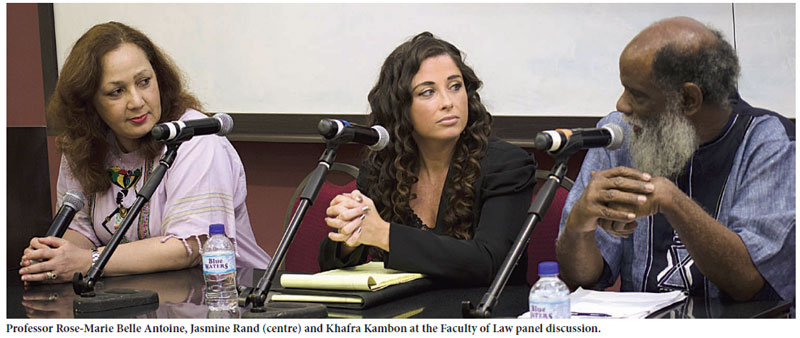
No incident better defines the condition of modern race relations in the United States of America than the killing of Trayvon Martin and its subsequent handling by the justice system. The 2008 election of Barack Obama to the US Presidency had allegedly heralded a new “post-racial age.” And while the accomplishment was amazing and there certainly has been change in the country’s racial dynamic, observers could argue quite convincingly that the shift had not been so profound. Four years later, in February 2012, the notion of a post-racial America died on a sidewalk in Sanford, Florida alongside 17-year-old Martin. Since then, Jordan Davis, Eric Gardner, Michael Brown and others have utterly dispelled that notion.
But despite the jarring reality that these incidents force us to face, there are still people willing to work and confront the system to try and bring society closer to that dream; not just of a place where race is not a factor but one in which true justice protects the interests of all people, no matter their differences. One of the ironies of the death of Trayvon Martin is that it brought about the emergence of such a person, a truly fierce and effective advocate for human and civil rights – Jasmine Rand.
“It’s not just race,” Ms. Rand explained, sitting with me in the dining room of The UWI Inn. “Sometimes it’s class, gender, religion. It is about the manner in which you are able to hold your government accountable for its actions.”
Followers of the Trayvon Martin case would recognise Ms. Rand as one of the attorneys for the Martin family. She regularly discussed the case on behalf of the family on networks like CNN, MSNBC and Fox News. On the day of the verdict for George Zimmerman, the man who shot Martin, she appeared on CNN wearing a hoodie. She would also create the “I am Trayvon Martin” campaign.
“I was relatively young,” she recalled her experience. “I had only been out of law school for two years when the case first started. It was incredible.”
Ms. Rand was in Trinidad and Tobago for a panel discussion entitled “Trinidad and Tobago’s International Obligations regarding Race Relations, Gun Violence and Human Rights – Assessing the Trayvon Martin Case,” hosted by the Faculty of Law on October 21, 2014.
Young and attractive in an immaculate business suit, at first impression she doesn’t seem like the type to make a career as an advocate for social justice, travelling around the world campaigning for things like the rights of Rastafarians in Jamaica, voting rights for ex-convicts and against human trafficking. But within a few minutes of interacting with her it is easy to sense both her plainspoken devotion to the many causes she has taken up and her iron determination to succeed.
How big is her ambition? Ms. Rand’s visit was part of her “I Am the Change World Tour”, a quest essentially to encourage people to fight against “oppression and mistreatment” in their countries.
“I am not committed to any particular human rights cause,” she said, because her commitment is to all.
Already her work has taken her to Colombia, Jamaica and Morocco, where she is consulting with the Supreme Court Justices to implement human rights throughout their national judiciary.
Her resume is expansive, professor and lecturer at several universities, including the prestigious Harvard Law School (as guest lecturer). She is a member of the National Bar Association of the US, where she holds the position of National Chair of the Human Trafficking Task Force and Deputy Chief of Staff to the President.
When asked about the source of her driven nature she points to her grandparents:
“They didn’t have a lot but they sacrificed everything they had to give me an opportunity to go to school and become a lawyer. That’s why I don’t take education for granted. Through their actions I was given an understanding of Christ. He sacrificed what he had for others. That is what I believe people should do and it is what I do. I give what I have to others.”
Apart from Ms. Rand, the Faculty of Law event included two other panellists – Mr. Khafra Kambon, President of the Trinidad and Tobago Reparations and Professor Rose-Marie Belle Antoine, Dean of the Law Faculty and a powerful advocacy attorney in her own right. Ms. Rand spoke on the Trayvon Martin case and the political situation in Trinidad and Tobago, focusing specifically on the divisions created through race and religion.
“When I go somewhere I want to see how the people live,” she said. “I love going to places and learning about the culture.”
But what of the case that started it all? Although the Martin family won a civil suit, Zimmerman received a not guilty verdict and is a free man today. How does a champion for social justice cope with what is quite often an unjust world?
“Getting the not guilty verdict left me numb. It’s really the love of the people that got me out of bed after that,” she said.
“You have to stand up for what’s right, win or lose. I have to humble myself and work for God’s earthly purpose. There’s a piece of me that probably gives up hope every day. Sometimes I feel inadequate. Sometimes I feel the world can’t change. But it’s not about me. At the end of the day, God is love and I have to believe light conquers darkness.”

|





